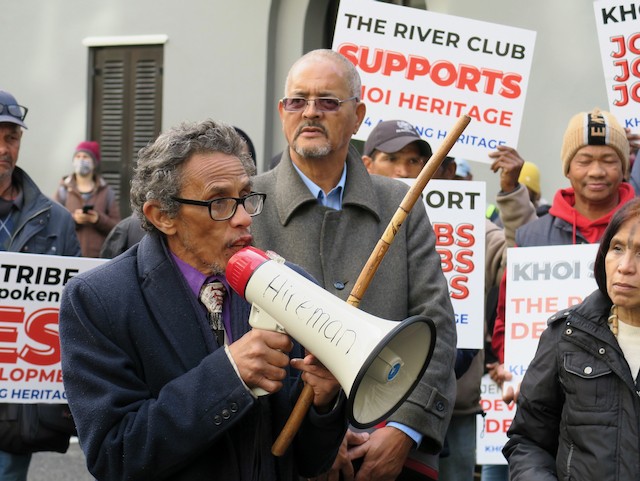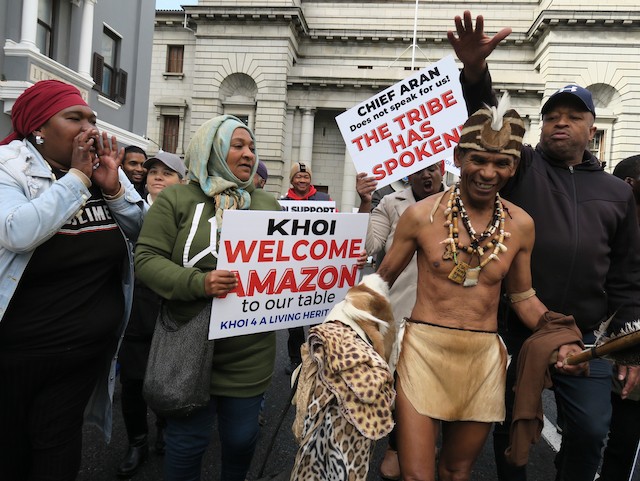River Club construction carries on amidst court delays
Observatory Civic Association says development is violating a court interdict
First Nations Collective leader Zenzile Khoisan addressing about 200 demonstrators supporting the River Club development outside the High Court on 12 July. Photos: Steve Kretzmann
- After numerous delays, the contempt of court case against the River Club developers has been argued in court.
- Goringhaicona leadership is split over development with one group mounting a legal counter challenge against opposition to the development.
- An appeal to order a halt to construction will be heard in October.
After numerous delays, despite having initially been set down as urgent, a contempt of court application against the controversial Amazon development in Observatory came before the Western Cape High Court on Friday, again as an urgent matter.
But it was then overtaken by a challenge as to who leads the Goringhaicona Khoi Khoin Indigenous Traditional Council, which together with the Observatory Civic Association (OCA), successfully got an interdict to halt construction at the site.
The latest application against Liesbeek Leisure Properties Trust (LLPT), the developer behind the R4.5-billion precinct at the River Club with Amazon as the anchor tenant, was brought on an urgent basis by the Observatory Civic Association, supported by three Khoi organisations.
OCA contends LLPT is violating an 18 March interdict to halt construction at the site, pending a review of the authorisations granted for the development by the Western Cape Province and the City of Cape Town.
The land on which it is being built is part of a floodplain at the confluence of the Liesbeek and Black Rivers, and is also deemed sacred to the Khoi nations. Heritage studies have confirmed it as the site of original land dispossession by Dutch colonisers.
LLPT’s subsequent application for leave to appeal the interdict, handed down by Deputy Judge President Patricia Goliath, was dismissed by her on 5 May in the High Court. But LLPT was subsequently granted leave to appeal by the Supreme Court of Appeal, following which it resumed construction at the site on 27 June.
Appearing before Judge Mokgoatji Josiah Dolamo on Friday, Peter Hathorn, advocate for OCA, argued Goliath’s interdict is an interlocutory order and thus remains in place until or unless the SCA rules otherwise.
Advocate Sean Rosenberg, for LLPT, argued Goliath’s judgment was final in effect, and so falls away in the face of the SCA’s leave to appeal.
Chief Aùtshumao! Francisco MacKenzie, who opposes development on the River Club site, is frogmarched away from the High Court by demonstrators in favour of the development.
Accusation of fraud
In the afternoon session, Anton Katz, advocate for a faction of the Goringhaicon, introduced a now linked notice of intervention application, accusing the spokesperson for the Goringhaicona Khoi Khoin Indigenous Traditional Council (GKKITC) Tauriq Jenkins of being a fraud.
This was highly relevant, as the GKKITC was together with the OCA, an applicant seeking the original interdict against LLPT.
Jenkins has represented the GKKITC in opposition to the development since it first filed for the interdict against the developers in August last year, and represented the GKKITC for years prior at heritage and municipal tribunals. But Katz argued that had no mandate to litigate against the developers on behalf of the GKKITC. He argued this would render Goliath’s judgement null and void.
The affidavits submitted with the intervention application were those of Edmen Hansen and attorney Tim Dunn, who was instructing Katz.
Hansen, who states he is the Goringhaicona Regent, testified that Jenkins had no authority to litigate on the behalf of the GKKITC. Added to which, he argued, Goliath’s order was predominantly premised on the GKKITC’s argument that there was insufficient consultation by the developer with all First Nations parties.
He wants the court to rescind Goliath’s order, claiming it “was obtained on the basis of fraud”, and the GKKITC be withdrawn as applicant in the contempt of court application against the LLPT.
First Nations schism
The announcement by LLPT in 2016 of its intention to develop was initially met with unanimous opposition by Khoi houses and organisations. But in November 2019 a Khoi grouping formed as the Western Cape First Nations Collective in favour of the development, splitting the Khoi houses.
In switching their position, the members of the First Nations Collective said the LLPT, headed by Jody Aufrichtig, had altered their development plans to include Khoi symbols, road names within the precinct, a medicinal garden, amphitheatre, and First Nations media house. The First Nations Collective say the development now recognises their heritage. Leader of the First Nations Collective, Zenzile Khoisan has stated this is the first time in 300 years their voices had been heard.
Clashes on the court steps
There have been ugly scenes as pro-development protesters clashed with Goringhaicona and those opposed to the development.
First Nation Collective supporters behind the development have hurled verbal abuse at Jenkins and assaulted Chief Aùtshumao! Francisco MacKenzie, frog marching him away from the court steps with insults and chants of “traitor”.
No corresponding violence by opposition to the development was witnessed by this reporter, nor reported.
On the day of the clash, cool drinks had been brought in for the pro-development demonstrators. The driver seen picking them up at the end of the day, was also one of three bodyguards protecting LLPT director Aufrichtig on Friday.
This reporter spoke to three pro-development demonstrators on 12 July, when a crowd of about 200 was gathered on the court steps behind a Western Cape First Nations Collective banner. All had held jobs on the River Club construction site. One said his boss, a subcontractor, had told him he should join the demonstration. Another said his colleague had told him he must join in. The third was vague. None of them were familiar with the Western Cape First Nations Collective, despite being behind its banner.
History of an urgent matter
12 July was the first day the contempt of court application appeared on the court roll. The matter was postponed, with the OCA and GKKITC foregoing an urgent hearing in favour of a judge being appointed to hear it on 22 July.
But it only came before court again on 27 July. On the same day an urgent notice was filed by attorney Tim Dunn, seeking to challenge Jenkins’ authority to litigate on behalf of the GKKITC. This was struck off the urgent roll by Judge Chantel Fortuin.
Fortuin said she recognised the urgency of the contempt of court matter and suggested the merits of the case be argued next week. She said she was inclined to order the developers to halt any further work on-site in the meantime. Hathorn said she had the constitutional right to do this, but she was dissuaded by Rosenberg acting for the LLPT.
Yet again, no judge was appointed by Judge President Hlope, resulting in the OCA bringing the contempt of court motion back on an urgent basis on Friday, but this time without the GKKITC as second applicant, to avoid the contestation of leadership within the Goringhacoina.
Accusations of lawfare
Hansen, in his affidavit informed by Dunn, accuses Cullinan and Associates, the firm representing the OCA of deliberately frustrating the legal challenge to Jenkins’ authority within the GKKITC.
But attorney Hercules Wessels, from Cullinan and Associates, stated he believed the notice of intervention seeking to depose Jenkins, as well as an application applying for a resultant rescission of Goliath’s interdict, was brought to frustrate the contempt of court application and buttress “the developer’s ongoing flagrant breach” of Goliath’s order.
Wessels also stated that Dunn had “studiously” avoided revealing his clients’ relationship to the developer and whether his clients were being financed by the developer, either directly or indirectly.
Legal path forward
As Katz wrapped up his argument on Friday afternoon, accusing Jenkins of being a fraud, Judge Dolamo requested Hathorn to provide his counter argument in writing, which Hathorn agreed to do by Tuesday. Katz would then submit his final response.
The matter of whether LLPT has violated Goliath’s order to halt building on the site, appears to hinge on Dolamo ’s judgement on the challenge to Jenkin’s leadership within the GKKITC, and on whether Goliath’s order is to read as interlocutory, or final in nature.
The SCA appeal is at this stage set to be heard by a full bench of the High Court on 11 and 12 October.
Meanwhile, construction at the River Club continues.
This paragraph was improved to reflect that the First Nations Collective was formed by a grouping of the Khoi, not all the Khoi: "The announcement by LLPT in 2016 of its intention to develop was initially met with unanimous opposition by Khoi houses and organisations. But in November 2019 a Khoi grouping formed as the Western Cape First Nations Collective in favour of the development, splitting the Khoi houses"
Support independent journalism
Donate using Payfast

Don't miss out on the latest news
We respect your privacy, and promise we won't spam you.
Next: Ugu municipality defends its record on water
Previous: Debunking the myth that Africa responded well to Covid
Letters
© 2022 GroundUp. This article is licensed under a Creative Commons Attribution-NoDerivatives 4.0 International License.
You may republish this article, so long as you credit the authors and GroundUp, and do not change the text. Please include a link back to the original article.
We put an invisible pixel in the article so that we can count traffic to republishers. All analytics tools are solely on our servers. We do not give our logs to any third party. Logs are deleted after two weeks. We do not use any IP address identifying information except to count regional traffic. We are solely interested in counting hits, not tracking users. If you republish, please do not delete the invisible pixel.


